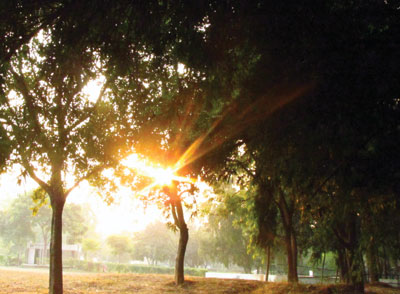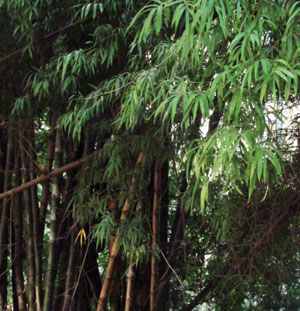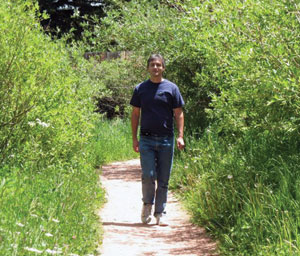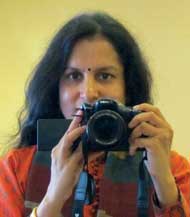- Home
- Archive -Mar 2012
- Messages from t. . .

Messages from the light
- In :
- Personal Growth
March 2012
By Aparna Sharma
Spiritual poetry is a window into territories beyond the body and the mind, says Aparrna Sharma
 |
In silence
Be still.
Listen to the stones of the wall.
Be silent, they try
to speak your
name.
Listen
to the living walls.
Who are you?
Who
are you? Whose
silence are you?
Who (be quiet)
are you (as these stones are quiet)….
I remember when I had first come across this poem by Thomas Merton years back. Perplexed, I took it to my Buddhism teacher to ‘understand’ it. This was a time when I was ardently practising a form of Buddhism. Being a ‘good Buddhist’ I devoted a large part of my life to faith, practice and study. I thought my life was on the right track. After all, I was doing all the right things, making all the right prayers (rewriting and editing them often, to make sure they were worded just right) chanting for hours everyday, visiting members, working in the organisation. Only it wasn’t.
I didn’t ‘understand’ the poem (neither did the teacher).
However, I continued to do the ‘right stuff’. After achieving a number of humongous goals and overcoming huge, impossible obstacles year after year, I think something happened. Something in me shifted. Something small, almost imperceptible. I found something within, smiling at me. Neither condescending, nor judging, just amused at all my effort. I realised I was like a baby in a crib who has been putting all his life’s effort and attention in pushing the side rod of the crib, with both his hands. And suddenly he notices a bemused elder smiling at him.
And for the first time, I understood why all my notebooks and pens and pencils and the teachers couldn’t help me ‘understand’ the poem, which simply asked “Who are you?” Merton further gave a clue:
Do not
think of what you are
still less of
what you may one
day be.
Rather
be what you are (but who?)
be the unthinkable one
you do not know……
I began to discover that virtually all the seers and masters were encouraging us to ask only this one question –
‘Who are you?’
Who am I?
Nisargadatta Maharaj says: “Give up all questions except one: ‘Who am I?’ After all, the only fact you are sure of is that you are. The ‘I am’ is certain. The ‘I am this’ is not. Struggle to find out what you are in reality.”
So that was what poetry did to me. It put me on the track. Much before I had heard the term ‘advaita’, much before I had had a clue that there is a ‘path’ for each one of us, poetry came to me as a pathway into my own soul.
Path back home
 The magical bamboo grove where poetry comes alive The magical bamboo grove where poetry comes alive |
Spiritual poetry, for ages, has been guiding us back to the source. It emerges from a part in our heart which is deeper than thought, deeper than any feeling or emotion. It emerges from a space beyond the conceptual, beyond ideas and notions of ourselves and of God. It addresses not our personality, but something beyond it. Spiritual poetry is our path into ourselves which takes us back Home.
Who says the path has to be only a meditation or chanting or prayer? Who says you need to have your spine erect or your eyes closed or see a white light? Poetry is one form which tells you that just sitting among the weeds, as though you were the weed, just stepping into water, just looking at the clouds, just walking on the grass, just feeling the breeze in your face with all your being, just BEING, with all the awe and wonder of being alive, is itself a path, is itself a prayer. Jalaal-ud-din Rumi says, “There are a hundred ways to kneel and kiss the ground.” Mary Oliver’s poem, Prayingsays:
It doesn’t have to be the blue iris,
it could be weeds in a vacant lot,
or a few small stones;
just pay attention,
then patch a few words together
and don’t try to make them elaborate,
this isn’t a contest
but the doorway into thanks,
and a silence in which another voice may speak.
Reading this gave me a confirmation that there does exist something, beyond the din of the day: ‘a silence, in which another voice may speak’
Silence was tough for a mind-oriented person like me. But the poem said so. And I wanted to hear. And I tried to hear. Oliver prodded me on:
“…who will care, who will chide you if you wander away
from wherever you are, to look for your soul?
Quickly, then, get up, put on your coat, leave your desk!
To put one’s foot into the door of the grass, which is the mystery,
which is death as well as life,
and not be afraid!”
I started to leave my desk and go out during my long lunch hour breaks. In Ivan Granger’s words,
“..a stolen moment when silence
has stolen me.”
I’d walk down to the leisure valley near by, and sit among the bamboo trees, next to a patch of water. An outsider would have considered it to be an ugly abandoned dump with stagnant water, but I called it my ‘bamboo grove’ and would spend hours sitting there, chanting, contemplating a poem or simply listening to the wind whistle through the bamboo trees.
At this time, the poet, Ivan M. Granger’s website http://www.poetry-chaikhana.com was my anchor. Everyday I’d receive a spiritual poem and Ivan’s commentary on it and take it to the Bamboo Grove with me. Hafiz says:
A day of Silence
Can be a pilgrimage in itself.
A day of Silence
Can help you listen
To the Soul play
Its marvelous lute and drum.
Gradually, I began to hear….I began to know that the wind whispers your name, if only you will hear.
Though my real life was a rollercoaster, with more lows than highs, those few precious hours of poetry everyday, became my sublime getaway. In retrospect, I can see how it healed me. St. Thomas of Aquinas says:
No one can change the course of His arrows
That does not mean that one should
not become adept at
ducking.
So poetry was my way of ducking fate’s arrows. It was my refuge. Needless to say poetry-chaikhana was, in a way, my first mentor. For a novice like me who lived a regular worldly life and had neither the time, nor the inclination for esoteric healings and meditations, spiritual poetry became a link for me to connect with my inner self.
No disconnect
 The poet, Ivan Granger, whose website Chaikhana has The poet, Ivan Granger, whose website Chaikhana hasmentored many seeking souls |
I feel that the beauty of poetry is in that it doesn’t disconnect you from where you are. It does not take you away from your present existence. It’s not a vertical liftoff or a great escape to some esoteric white light elsewhere; rather, it brings that light down into our very reality.
Sri Aurobindo never followed any guru or set tradition, but carved his own spiritual path. As a revolutionary freedom fighter, when he first deliberately met a yogi, he told him upfront: “I want to do yoga but for work, for action. Not for sanyasa (renouncing the world) and nirvana.”
The yogi’s reply deserves to be remembered. He said: “It would be easy for you as you are a poet.” Wendell Berry wrote:
we pray, not
for new earth or heaven, but to be
quiet in heart, and in eye, clear.
What we need is here.
Beyond the mind
Poetry acts like the technique of the koan that the Zen Masters used. The koan would be a story or a line or a question like, ‘What is the sound of one hand clapping?’
There could be no answer to this. That was the very purpose. The koan was intended to confound the mind, to perplex it to the extent where the intellect gets annihilated and the mind gives up, and all we are left with, is an experience. The experience could be of truth, or emptiness or fullness or divine love – to each his own. Similarly, for those who love words, poetry serves as the medium to take us beyond the domain of the intellect.
Ivan Granger says, “Poetry has an immediate effect on the mind. The simple act of reading poetry alters thought patterns and the shuttle of the breath. Poetry induces trance. Its words are chant. Its rhythms are drum beats. Its images become the icons of the inner eye. Poetry is more than a description of the sacred experience; it carries the experience itself.’
Rabindranath Tagore felt this and he said, “I touch God in my song as the hill touches the far-away sea with its waterfall.”
An expression of truth
As there cannot be one set of black and white truths, there can be no one correct experience of the truth. For ages, this truth has been difficult to explain.
Amir Khusrau said succinctly: ‘Jo jaane so kahe nahi, jo kahe so jaane nahi.’
(Those who know, do not say, and those who say, know not…) Rabia, the Sufi poet declares:
The one who tastes, knows;
the one who explains, lies.
How can you describe the true form of Something
In whose presence you are blotted out?
In Zen there is a saying that says that the best experience is one that cannot be spoken about. The next best is poetry. The worst is a discourse.
Therefore many of the seers who experienced the truth, expressed it in some creative form or the other. Some wrote about it, some composed songs, some, like the eastern Taoist and Buddhist masters, depicted it in the pictorial form of the classical Chinese, Tibetan or Japanese scripts. Many of the eastern masters came up with these pictorial representations of their enlightenment, in the form of the Gohonzon or elaborate paintings. And yet others, composed poems.
Virtually, every spiritual tradition has relied on poetry to convey a bit of what the seers ‘saw’. They used it to express the state of divine communion or their journey or all the experiences on the spiritual path. Since it was not always possible to convey to the people their great insight, the seers and masters of the past used the medium of poetry or mantra or esoteric verses to describe their enlightened experience. Poetry is the incarnation of their spiritual vision. Sri Aurobindo defines it as ‘the mantra of the Real.’ In fact, the Vedas, the oldest sacred texts, are nothing but the ultimate truth expressed in metaphors in poetry.
 Aparrna Sharma is a writer, amateur Aparrna Sharma is a writer, amateurphotographer, and above all, a seeker. An educational consultant by profession, she is based in Chandigarh, India. mail:aparnasharmachd@yahoo.com |
Thus Rajni Taneja, a university teacher and spiritual seeker from Delhi surmised it completely saying: “Poetry is what comes out from the heart. And poetry is also what takes us back to the heart.”
My friend Jim Atwell, a poet from Pennsylvania, describes spiritual poetry as:
“It is like watching a sunrise. You know that you are in darkness and you start to see the light on the horizon. You are captivated by the ever increasing beauty as the sun slowly rises on the horizon and brings forth light. Eventually, the sun totally arises and you see that the darkness you were in was only temporary and that the sun is forever shining.
‘Spiritual poetry is like foreplay for the divine. It works you up into a frenzied state of mind and then gives you release into the unknown.
‘Spiritual poetry is a journey inwards that takes your soul to lands it once knew long, long ago.
‘Spiritual poetry is a personal journey that takes you to places you never knew you never knew.
‘Spiritual poetry is a love song that sings to the heart of the beloved that only silence hears.”
I feel that spiritual poetry, like prayer, is the sound of the surf of the ocean. Everyone has his private beach and his own path to it. Meandering though we may be, and lost, yet poetry has the power to bring us back to that beach.
In reading poetry, we don’t have to create anything, we don’t have to manufacture any emotions or feelings. We can’t make it happen. It already is. All we have to do is to remember. To simply dive in, partake of that salt water, and everything….everything in it – the sound of the waves crashing against the rocks, the salty sweet smell of the ocean air, the dampness of the wet sand, the taste of the sweet moisture – everything will come back to us.
One verse that touches our heart and all that we originally ARE will come back to us.
To read more such articles on personal growth, inspirations and positivity, subscribe to our digital magazine at subscribe here
Life Positive follows a stringent review publishing mechanism. Every review received undergoes -
- 1. A mobile number and email ID verification check
- 2. Analysis by our seeker happiness team to double check for authenticity
- 3. Cross-checking, if required, by speaking to the seeker posting the review
Only after we're satisfied about the authenticity of a review is it allowed to go live on our website
Our award winning customer care team is available from 9 a.m to 9 p.m everyday
The Life Positive seal of trust implies:-
-
Standards guarantee:
All our healers and therapists undergo training and/or certification from authorized bodies before becoming professionals. They have a minimum professional experience of one year
-
Genuineness guarantee:
All our healers and therapists are genuinely passionate about doing service. They do their very best to help seekers (patients) live better lives.
-
Payment security:
All payments made to our healers are secure up to the point wherein if any session is paid for, it will be honoured dutifully and delivered promptly
-
Anonymity guarantee:
Every seekers (patients) details will always remain 100% confidential and will never be disclosed
